|
 
 |
|
 |
Donald Dush
Specialist Fourth Class, M-60 Gunner, A-66, the Troop Commander’s ACAV (Armored Calvary Assault Vehicle)
I remember sitting around the CP [command post] on 26 March 1970, listening to the radio traffic. More, I remember hearing the conversations and watching the faces, yours [John Poindexter’s] and the others around you. It wasn’t too difficult to dope out where we were going long before anyone actually said it.
The move through the jungle was a scary and most uncomfortable time. I really didn’t know what to expect. I had not had a shot fired at me yet. I do remember listening to the air strikes and small-arms fire, seemingly for hours while we were en route, and thinking how crazy it was that we were simply driving into that.
Men emerged from the underbrush from what seemed to be almost under our tracks. I could see your [Poindexter’s] mouth moving and read your lips. I could not hear you. You were shouting “Fire, Fire!” I got on my M-60 and began to fire…I really didn’t see anything to aim at; I was just trying to cover as much of what was in front of me as I could.
I got hit by shrapnel. Strangely, I saw it coming but could not move out of the way. It hit me on the lower lip mostly and knocked me back away from the gun. The lower part of my face was instantly numb and burning. I reached up to feel my face and my hand came away bloody. Now I was mad instead of afraid.
I remember the grunts [U.S. infantry] being loaded up inside A-66 as we left the contact area. The inside of the track was full of men. I’m sure some of them were dead. I squatted down into the track to move them around and make a place to stand so that I didn’t stand on the dead or wounded. The thought of standing on those men horrified me.
One of the things that sticks with me is how easy it would have been to ambush us on the way back. Our track basically had nothing to fight back with.
Two days later, I was sitting in the field hospital waiting to have someone take some of the shrapnel out of my face. I sat on the makeshift stretcher and watched as the soldier next to me was having shrapnel dug from the back of his legs. It occurred to me then that my face wasn’t as bad as I thought it was and that I really wasn’t all that interested in the Purple Heart. I don’t know if they missed me, they were busy with men who were wounded worse than I was. I still carry that little piece of shrapnel in my lower lip today and plan to be buried with it.
Top |
 |

 |
|
 |
Pasqual Gutierrez
Staff Sergeant, Platoon Sergeant, A-27
It’s easy to pick out Vietnam veterans in a crowd whenever a helicopter flies overhead. It’s those 50 to 60 year old guys looking up and just staring into a time gone by. My wife says she can always pick a veteran out by the look of distant fires in their eyes — they are the gentle souls, just happy to be where they are, who find almost everything around them somewhat amusing. I guess it comes from not sweating the small stuff.
Before the battle on 26 March, we knew something was in the air by the seriousness on the faces of the First Sergeant, the lieutenants and Captain Poindexter as they milled around the command post.
I expected once the enemy caught wind of us arriving they would pick up and disappear into the jungle as so many times before. Upon entering the area of contact, my first sense that something terribly bad had happened was the sight of ponchos with jungle boots hanging out of one end — I felt my heart stick in my throat when realizing that what I was looking at were dead American soldiers.
Lieutenant Healey came over the radio and said, “Watch yourself, Gus, this one’s for real.”
I began to lay down [Sheridan tank] cannon fire to the right, center and left and swung back right again. I thought of my mom and dad, brothers and baby sisters and focused on what was in front of me all at the same time.
A loud explosion came from my left and I turned to see Sergeant Foreman whiplash backwards behind his gun shield as he was hit. Without Sergeant Foreman to my left, A-27 was now exposed on the immediate right and left, and toe-to-toe with an enemy that was seriously returning fire and had no intention of withdrawing.
I don’t remember our loader’s name, but I can clearly see his face. I must have looked at his face a hundred times that day as he handed me grenades so I could throw them at the bunker openings to keep those RPGs (rocket propelled grenades) from coming at us. John Biggs, our gunner, would pop up out of the turret to cover my back every time I turned to get another ammo can.
Just as suddenly as it had all started, it was over. I was not aware until then that hours had passed, that I had gone through thousands of rounds of .50 caliber ammo, used all of our grenades and only had a few high-explosive cannon rounds left.
The war made a better man of me, more appreciative of life and thankful to be here and now, in this time and place. There is part of my soul which is void of emotion and sensitivity…I am sure this results from the sudden and traumatic experiences of Vietnam and the loss of innocence at such a young age.
I will be forever thankful to the crew of A-27 and their American spirit – and John Biggs for covering me! Everyone who served in Vietnam has a story, a story that sometimes takes years to be told.
Top |
 |

 |
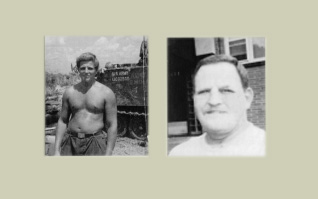
|
 |
August Whitlock
Private First Class, Field Cook, Headquarters, Alpha Troop
I was a so-called “field cook.” I was one of the mess hall personnel who volunteered to fly chow out there [to the troops in the field] with the ammo, letters and other things. That night the mortar went up in explosions, I remember seeing a guy named Chip run for one of his friends who was in the middle track. Before Chip got there, another explosion happened and he and another guy were blown away.
The day after, no one was hungry. I waited for Smo (Sergeant Francis Smolich) to tell me what to do since I wasn’t cooking. Smo had just lost his good friend, Chip. He lost more than that because a lot of guys listened to Smo all the time and his relationship with Chip was entertaining among the men. If Smo cried that night, I never saw it, but half the men were out of their minds because we lost Chip. Chip told us something not long before his death: he volunteered for the Army rather than being drafted. When asked why he joined, he said that he had lived 20 years in freedom; everyone there in Vietnam didn’t even know what freedom really was, Chip said. He wanted to get it for them. I saw a lot of guys change their minds when Chip told them that. When Chip was gone, they were changed forever.
When [Captain Poindexter] came out and told everyone to saddle up and move out toward the battle site, a couple guys were left behind by Smo; Smo said that mentally they were not ready to deal with another firefight and that’s all any of us knew was going to happen, going to another firefight. What we went to, however, was something bigger than any of us ever realized.
As I was being processed out of Vietnam, one of the specialists handed me my medals and asked if I was ever involved in a major battle. I told him about that battle in War Zone C. He looked on his list and said there was no battle there.
A lieutenant came up behind him and asked what the problem was. He related what I said and they moved on. As far as I know, that battle was largely overlooked. That’s why I think its name should stay the way it is now — the Anonymous Battle.
Top |
 |

 |
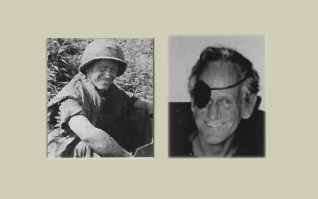
|
 |
Ronald Vaughan
Sergeant, ACAV Commander, A-33
There are a lot of things I wish I could forget, but I can’t. It took about twelve years of counseling at the Veterans Center to work with me to tell it all. And I still have nightmares and flashbacks.
I remember the night the mortar track blew up. My men woke me up and it looked like the Fourth of July. I told my men to go to the next track and to stay and wait for me. I then got into the driver’s seat and drove A-33 toward the burning track. Someone else and I put a man inside and he was pretty messed up. He died before we got him to safety.
I was still stuck [between two trees at the battle site] when I heard that my best friend, SFC Foreman, was KIA. My ammo was getting low and my barrel was burned out, and I was having all kinds of cook-off rounds. I was just about to change it when all of a sudden an RPG [rocket propelled grenade] hit a tree on my right. I got the back blast and shrapnel flew into my face and both eyes. After I got out of the Army three years later, I started having surgery on my right eye, which I later lost.
All I remember about the 26th was that I was scared shitless and I did not want to die. At that time I was mostly trying to get off of that damn stump [where the ACAV was lodged] to where I could get on-line with everyone else [and fight].
Tomorrow [in 2004] I will be 53 years old and I do not feel like I am getting older. I got old when I was 18 and was sent to Vietnam. At the age of 19, I got older when I was a sergeant and a track commander. And at that time I felt that I was robbed of my youth. Like every one of us…
Top |
 |

 |
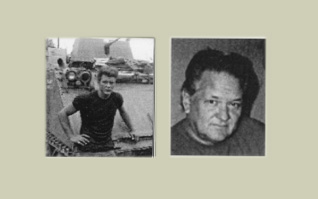
|
 |
Francis Smolich
Sergeant, Mortar Section Chief, A-86
On the night of March 25, 1970 I was asleep, with my boots off, when I was awakened by an explosion. One of my tracks … was burning. The two men inside had literally been blown in half. I saw a medic and another man run over and try to get into the burning vehicle. I yelled to them, “Get away, it’s too late!” But they were still trying to get in when it blew.
With the other two [mortar] tracks secured, I made my way to the observer track where I spent the rest of the night nauseated and sick. In the morning, I went to the command post and when I walked in, the first sergeant and troop commander looked like they’d seen a ghost. They thought I had been one of the men burned in the track. The troop commander gave me a big hug and the first sergeant immediately took me off the KIA list.
When we came back in from the battle, our troop commander was badly wounded. As he got down from his track, I saw his knees buckle. I ran and grabbed him right away and helped him back to the CP. Everyone responded quickly and worked hard to get the wounded and dead medevaced out. The medevacs were in and out for most of the night.
Things were happening so rapidly those last two weeks in March 1970.
Top |
 |

 |
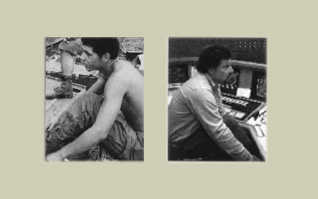
|
 |
Ronald Bench
Sergeant, Mortar Section NCO, A-35
During March 1970, I arrived in-country and was issued jungle fatigues, combat boots and a poncho liner. [I was] sent to the 11th Cav area in Long Binh.
On March 26, [I took] a trip to the airfield. The clerk reported to the CO in the field by radio and was told to get us to the chopper on time or else! It seems our fresh young bodies were needed at once.
We were dumped outside the perimeter and the bird flew off. Here’s the scoop: The three line platoons and a few of the headquarters platoon were out in the jungle approaching a bunker complex. A company of grunts had come up against this dug-in fortress and made an assault. They had been pinned down and our CO had volunteered [Alpha] Troop to get them out.
We had arrived on-scene … with no knowledge of [the mortar accident the night before. We then learned that] the exploding mortar round ruptured the gun barrel and sprayed hot shrapnel throughout the interior of the vehicle. Shortly thereafter, the big stack of burning ammo alongside the vehicle detonated, spewing mortar rounds and spreading them around, where many detonated in the air or upon striking the ground. Most of the mortar crew were killed or wounded.
While [I was] trying to figure out what was going on, the air was suddenly filled with a muffled roaring sound. “There they go!” someone said. That was the sound of A Troop, First Squadron of the 11th Armored Cavalry Regiment, engaging the NVA bunkers. The sound went on for quite some time and then became silent for a bit. Then the roaring started again.
I don’t remember much between then and full dark when the troop returned to the night defensive position. Sounded like several freight trains crashing through the forest. Some sight! [Twenty] armored vehicles … roared out of the thick jungle and inside the perimeter. It was like the jungle was erupting hell into the encampment. There was a great deal of noise and dust and lights making eerie shadows around camp and in the surrounding jungle.
One Sheridan tank drove directly into the middle of the compound. The word was that they needed help freeing their platoon sergeant whose body was trapped in the turret by a direct hit from an RPG. A KIA. I returned to the mortar section and watched in awe as the dust-off helicopters started arriving and the mortar men fired illumination rounds to facilitate the removal of the dead and wounded.
The sounds and smells and sights, all buffeting my emotions without mercy, combined with the realization that I was really in the thick of it, were almost too much to assimilate. It was just too unreal and unbelievable. It was the first step in conditioning my brain to realize that no matter what kind of perverted hellish universe I had been transported to, I was certainly far from the real world.
Top |
 |

 |
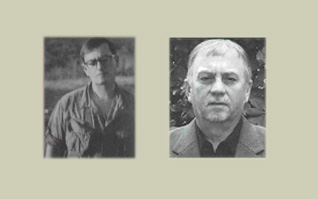
|
 |
Donnie Colwell
Sergeant, Medic Track Commander, A-81
I was 50 feet from the [mortar] explosion and was the first one there. Wakefield [Joe Wakefield, a mortar section NCO] was alive but limbless. [Floyd] Coates was dead from horrific wounds. [Walter] Andrews was alive, but had severe wounds. His nickname was Chip. Another man and I tried to move Andrews to safety, but we could not. Live rounds began to explode from the fire and we had no choice but to escape. It haunts me to this day.
When daylight broke, I used the silk from parachute flares to load the bodies onto stretchers. The fire had literally cooked their corpses. A Chinook landed and the crew helped me put them on the chopper. Even after my warning not to, the Chinook crew chief looked at one of the bodies and was ill immediately. I wasn’t surprised.
Twenty-six March in the afternoon was one day of hell on earth. The tanks were moving on-line when one of the grunts on the ground stood up and pointed to the left front. He was shot and went down. The head medic, Gary Felthager, and I dismounted. He took his bag, and I took my M-16.
The tanks began to assert their firepower and we moved forward slowly, but more and more wounded were being treated by Doc. How many he saved I don’t know, but it was a significant number.
Finally, we retreated to a place of relative safety in the former NDP. My AVAC had six or eight wounded soldiers. Still, Doc worked his expertise to save life and limb.
So many officers had been injured. I found myself doing triage on people who were hurt. One of the wounded had an emergency tracheotomy performed on him. The end of a ballpoint pen was inserted into his throat and he was alive when he flew out.
Many men were heroes that day, but my observation of Doc Felthager made him my personal hero. The actions of A Troop, in my opinion, saved the lives of the grunt company. We barely saved them and ourselves and had we not been there, they wouldn’t have made it to daylight.
Top |
 |

 |
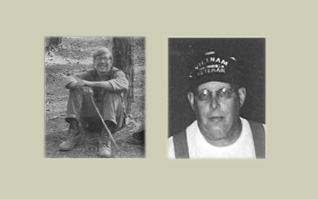
|
 |
Paul Evans
Private First Class, Rifleman, Charlie Company, Second Battalion, 8th Cavalry, 1st Cavalry Division (Airmobile)
I was in the field for only two weeks [when the battle occurred]. All of a sudden, it hit! I was by an anthill and it was loud and noisy. I was scared, face down on the ground. The next thing I knew, our field first sergeant, Sergeant Dawson, snatched me and told me to look up. There was a lull and then it hit the fan again. [So] I just let go on “rock-and-roll” with my M-16.
In the firefight, I was scared and so was everyone else. The noise, the smoke, the yelling. We had to know how it was going to end; we were fighting for our lives. We knew we were taking a lot of KIA and wounded [and] we kept fighting. Choppers and all the noise, I just heard jets and gunships.
Then out of nowhere, the [Alpha Troop] tanks came busting out of the jungle. I remember one of the tanks had “Aunt Jemima” painted on the barrel. I was an 18-year-old green kid in my first firefight and it was great to see.
Captain Hobson, my CO, was running around giving orders. He had a cut on his face from shrapnel. We were told to get on the vehicles so we could get out of there, and I jumped on an APC with no guns. We were on top and I looked inside and saw the wounded.
They got us to a clearing and fed us hot chow. They told us not to worry about guard duty; we could get some rest. The next morning they fed us a hot breakfast [and afterward] we [drove] a few [kilometers] to fire support base Illingworth.
I will always remember what Alpha Troop 1/11 ACR did for us. For 34 years [in 2004], they have been my heroes and always will be. I feel that if Alpha Troop had not come to rescue us, I would have been killed or missing in action. I can only speak for myself, but I am sure my fellow troopers feel the way I do.
Top |
 |
|


![]()
![]()
![]()
![]()
![]()
![]()
![]()
![]()
![]()

